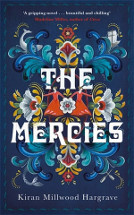The Mercies by Kiran Millwood Hargrave

Picador, 2020. ISBN: 9781529005127. 256pp.
Maren lives in the tiny settlement of Vardo on a Norwegian island in
the Barents Sea close to the north-east border with Russia. It is
1617, a time when Christianity is concerning itself with devilry and
witchcraft. On Christmas Eve a sudden storm drowns most of the Vardo
menfolk who had put to sea to capture a school of fish. The storm
drowns Maren's fiancee, Dag, her brother Eric and her father as well
as the pastor. Altogether 40 men die and the women of the settlement
grasp at reasons, including the suggestion that the devil sent the
storm. Eric's pregnant wife, Dina, is from the Sami, the indigenous
people of the area and the devout women direct suspicion at her,
saying the Sami can call the devil. After nine days the bodies of
the men begin to wash ashore and the women retrieve the bodies and
store them until the earth thaws enough to bury them and Dina brings
a Sami shaman to watch over the bodies and conduct rites for the
dead creating further conflict. However the need to survive without
the men leads the women to work together and put out to sea, netting
fish as their menfolk had done. Eventually Pastor Nils Kurtsson is
sent to lead the community but some of the women have tasted
independence and found strength in it. When a Lensmann, Hans Koning,
a kind of lord or sherrif, is appointed, he in turn appoints a
Commissioner, Absalom Cornet, to travel to the village, stamp out any
heathen tendencies and promote the church. He brings with him his
bride, Ursa, from Bergen to the south. As Absalom starts to pursue
his agenda, Ursa forms an unlikely friendship with Maren. The
narrative swings from Maren's perspective to Ursa's and they both
watch with horror as the witch hunting in the settlement starts to
unfold.
Based on historical events, the narrative reflects on some of the
uglier aspects of human nature and the redeeming qualities of true
loyalty and friendship. A hitherto unexamined period and setting
that will appeal to readers of historical fiction.
Sue Speck